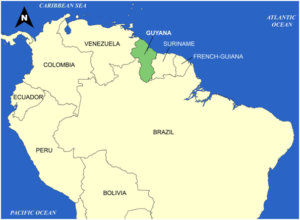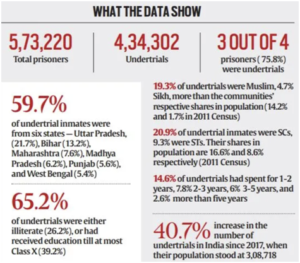IASbaba's Daily Current Affairs Analysis
Archives
(PRELIMS & MAINS Focus)
Syllabus:
- Prelims & Mains – CURRENT EVENT
Context: As the stalemate over climate finance negotiations continues at COP29 in Azerbaijan’s Baku, a group of developing countries expressed “concern” and complained that their needs were not being given attention while the interests of the developed countries were being sought to be protected.
Background: –
- Speaking on behalf of the Like Minded Developing Countries (LMDCs), a group that also includes India and China, Bolivia complained of “imbalance” in the discussions and the negotiating process.
Key takeaways
- The New Collective Quantified Goal (NCQG) is a climate finance target set to replace the previous commitment of $100 billion per year by developed countries to support climate action in developing countries.
- The NCQG is a central theme at the COP29 climate summit in Baku, Azerbaijan, where countries are negotiating the exact target amount.
- Developing countries are advocating for a substantial increase in climate finance, proposing a target of at least $1.3 trillion annually from developed nations to support climate action.
- Developed nations emphasize the principle of “common but differentiated responsibilities,” asserting that developed countries, having historically contributed more to greenhouse gas emissions, should bear a greater financial burden.
- Developed Nations’ Position: Developed countries suggest that wealthier developing nations also contribute to climate finance, arguing that the current economic landscape has evolved since the original agreements.
- Key Points of Contention: Disagreements persist over what constitutes climate finance, including the balance between grants and loans, and the sources of these funds. Developing nations express concerns that stringent emission reduction targets could hinder their economic growth, advocating for flexibility in commitments.
- Current Status: Negotiations remain at an impasse, with both blocs holding firm on their positions. The outcome of these discussions is crucial for establishing a new global climate finance goal and determining the future framework for international climate action.
Source: Indian Express
Syllabus:
- Prelims – GEOGRAPHY
Context: India and Guyana sealed 10 agreements to strengthen cooperation in hydrocarbons, digital payment systems, pharmaceuticals, and defence after bilateral talks between Prime Minister Narendra Modi and Guyanese President Mohamed Irfaan Ali.
Background: –
- Prime Minister Modi’s visit to Guyana marked a significant milestone in strengthening India-Guyana relations. This visit was notable as it was the first by an Indian Prime Minister to Guyana in over 50 years.
Key takeaways
- Location: Northeastern part of South America, bordered by the Atlantic Ocean (north), Venezuela (west), Brazil (south), and Suriname (east).
- Capital: Georgetown.
- Major Rivers: Essequibo, Demerara, Berbice.
- Climate: Tropical, with rainy and dry seasons.
- Population: ~800,000 (2023 estimate).
- Ethnic Groups: Indo-Guyanese (descendants of Indian laborers), Afro-Guyanese (African descendants), Indigenous peoples.
- Language: Official language is English.
- Religion: Christianity, Hinduism, and Islam are predominant.
- Guyana is home to a part of the Amazon rainforest, one of the most biodiverse regions in the world

Economy
- Natural Resources: Bauxite, gold, diamonds, timber, and recently discovered offshore oil reserves (2015).
- Key Sectors: Agriculture (sugar, rice), mining, and oil.
- Oil Boom: Significant oil discoveries by ExxonMobil; Guyana is emerging as one of the fastest-growing economies in the world.
- Independence: Gained from the United Kingdom on May 26, 1966.
- Member: CARICOM (Caribbean Community), UN, Commonwealth.
Source: Indian Express
Syllabus:
- Prelims – INTERNATIONAL
Context: Prime Minister Narendra Modi proposed seven key pillars to strengthen ties between India and ‘CARICOM’.
Background: –
- Modi made the remarks as he joined leaders from CARICOM countries for the second India-CARICOM Summit in Guyana.
About CARICOM
- The Caribbean Community (CARICOM) is an intergovernmental organization that promotes economic integration and cooperation among its 15 member states and 5 associate members throughout the Caribbean region.
Purpose:
- Economic Integration: Promote economic integration and cooperation among member states.
- Equitable Benefits: Ensure that the benefits of integration are equitably shared among member states.
- Coordination: Coordinate foreign policy and regional security among member states.
Key Objectives:
- Trade: Facilitate the free movement of goods, services, and capital among member states.
- Development: Promote sustainable development and reduce poverty in the region.
- Security: Enhance regional security and stability.
Member States:
- Full Members: Antigua and Barbuda, Bahamas, Barbados, Belize, Dominica, Grenada, Guyana, Haiti, Jamaica, Montserrat, Saint Kitts and Nevis, Saint Lucia, Saint Vincent and the Grenadines, Suriname, Trinidad and Tobago.
- Associate Members: Anguilla, Bermuda, British Virgin Islands, Cayman Islands, Curaçao, Turks and Caicos Islands
Source: Indian Express
Syllabus:
- Prelims – SCIENCE & TECHNOLOGY
Context: After satellites and launch vehicles, the Indian National Space Promotion and Authorisation Centre (IN-SPACe) is looking at ways for entry of private players in ground segments, according to a consultation document prepared by it.
Background:
- Ground stations are essentially ground-based antennas that help in communicating with the satellites. Offering ground station as a service (GSaaS) such as satellite control, telemetry and tracking, space data reception, and space situational awareness on pay-per-use basis, the sector has been envisioned to grow 30% by 2033 — from $0.14 billion to $2.5 billion, according to the document.
About IN-SPACEe
- The Indian National Space Promotion and Authorization Centre (IN-SPACe) is a single-window, autonomous agency under the Department of Space (DOS) of the Government of India.
- It was established in June 2020 to facilitate and promote private sector participation in the Indian space sector.
Purpose:
- Promote Private Participation: Enable and nurture non-governmental entities (NGEs) to accomplish their ventures in the space sector.
- Authorize and Supervise: Authorize space operations and services in the country through a well-defined framework.
- Boost Space Economy: Accelerate the development of the Indian space ecosystem and boost the space economy.
- Share Space Infrastructure: Allow NGEs to share space infrastructure and premises under the control of DOS/ISRO.
- Establish New Infrastructure: Support the establishment of new space infrastructure and facilities.
Source: Indian Express
Syllabus:
- Mains – GS 2
Context: Union Home Minister Amit Shah recently said that undertrials who have spent more than a third of the maximum prescribed sentence for the crime they are accused of committing should be released before Constitution Day (November 26).
Background: –
- Home minister highlighted the new relaxed provisions on bail for first-time offenders in the Bharatiya Nagarik Suraksha Sanhita, 2023 (BNSS).

Key takeaways
- As per the National Crime Records Bureau’s (NCRB) 2022 report, undertrial prisoners constitute approximately 75% of the total prison population in India. The same report indicates that India’s 1,330 prisons have an occupancy rate of 131.4%, highlighting severe overcrowding.
- Prolonged court proceedings result in extended pre-trial detentions, contributing to the high number of undertrial prisoners. Many undertrial prisoners come from marginalized communities and lack resources to secure bail or legal representation.
- The prolonged detention of undertrial prisoners raises serious human rights issues, including the right to a fair and speedy trial.
- Section 479 of the BNSS lays down the “Maximum period for which [an] undertrial prisoner can be detained”. It states that a prisoner who is not accused of offences punishable with death or life imprisonment shall be released on bail if she has “undergone detention for a period extending up to one-half of the maximum period of imprisonment specified for that offence under that law”.
- This same standard was provided under the previously applicable Code of Criminal Procedure, 1973 (CrPC). But the BNSS has also relaxed the standard further in cases concerning “first-time offenders” — requiring such accused persons to be released on bail after they have spent one-third of the maximum possible sentence in prison.
- In August, Supreme Court held hearings on the issues faced by undertrial prisoners in the case In re: Inhuman conditions in 1382 prisons.
- The case began as a PIL after former Chief Justice of India R C Lahoti sent a letter to the court, highlighting various issues in prisons.
- Senior Advocate and amicus curiae Gaurav Agrawal submitted on August 13 that Section 479 of the BNSS needs to be implemented at the earliest and it will help in addressing overcrowding in prisons.
- Noting that the new provision was “more beneficial”, the court on August 23 ordered that Section 479 would apply “retrospectively” to cases that were registered against first-time offenders even before the BNSS came into effect on July 1, 2024.
Source: Indian Express
Practice MCQs
Q1.) Which of the following statements about CARICOM is/are correct?
- CARICOM is an economic and political organization of countries in the Caribbean region.
- Guyana is a founding member of CARICOM.
- The official working language of CARICOM is French.
Select the correct answer using the codes below:
a) 1 and 2 only
b) 2 and 3 only
c) 1, 2, and 3
d) 1 only
Q2.) Consider the following statements about Guyana:
- It is one of the world’s fastest-growing economies due to its offshore oil reserves.
- The Essequibo River, Guyana’s largest river, flows within the disputed region with Venezuela.
- Guyana is a member of the Organization of Petroleum Exporting Countries (OPEC).
Which of the statements given above is/are correct?
a) 1 only
b) 1 and 2 only
c) 2 and 3 only
d) 1, 2, and 3
Q3.) Which of the following statements regarding IN-SPACe (Indian National Space Promotion and Authorization Center) is/are correct?
- It is an autonomous body under the Department of Space (DoS).
- IN-SPACe regulates and promotes private sector participation in India’s space activities.
- It replaces the NewSpace India Limited (NSIL) as the commercial arm of ISRO.
Select the correct answer using the codes below:
a) 1 and 2 only
b) 2 and 3 only
c) 1 and 3 only
d) 1, 2, and 3
Comment the answers to the above questions in the comment section below!!
ANSWERS FOR ’ Today’s – Daily Practice MCQs’ will be updated along with tomorrow’s Daily Current Affairs
ANSWERS FOR 21st November – Daily Practice MCQs
Q.1) – c
Q.2) – d
Q.3) – c











